#john stuart mill
Explore tagged Tumblr posts
Quote
There are many truths of which the full meaning cannot be realized until personal experience has brought it home.
John Stuart Mill, On Liberty
844 notes
·
View notes
Text

“How can great minds be produced in a country where the test of a great mind is agreeing in the opinions of small minds?”
— John Stuart Mill
#john stuart mill#literature#lit#literature lover#literature quote#literature quotes#english literature#philosophy#philosophical#philosopher#philosophers#philosophy of life#philosophy quote#philosophy quotes#quote#quotes#excerpts#excerpt#quoteoftheday#booklover#book#bookworm#books#booklr#book quotes#book quotations
133 notes
·
View notes
Text
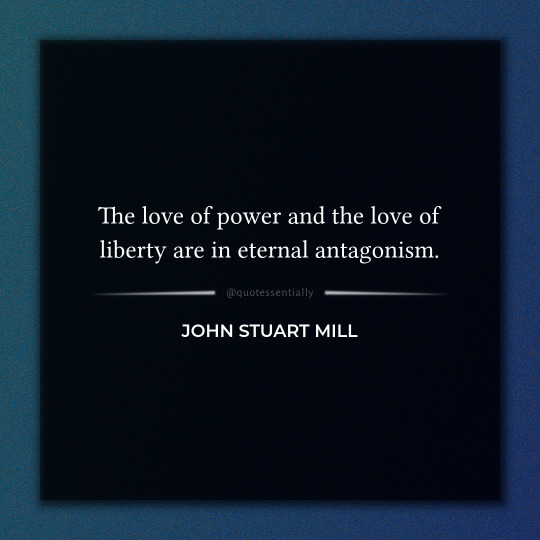
From John Stuart Mill’s The Subjection of Women
12 notes
·
View notes
Text
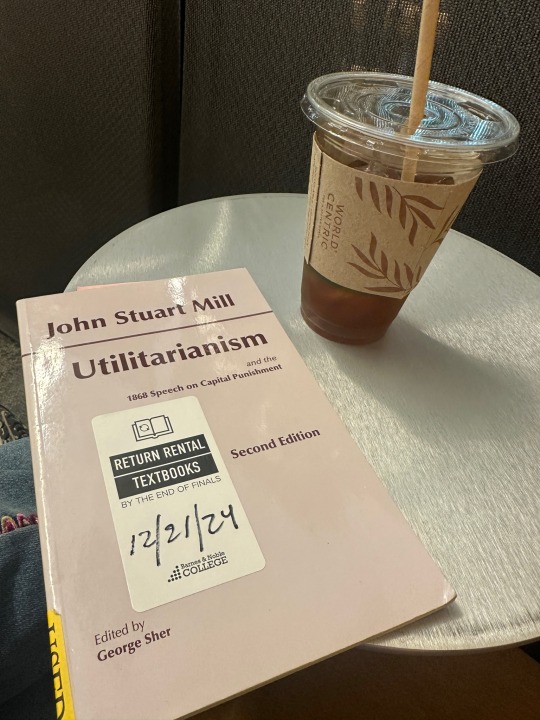
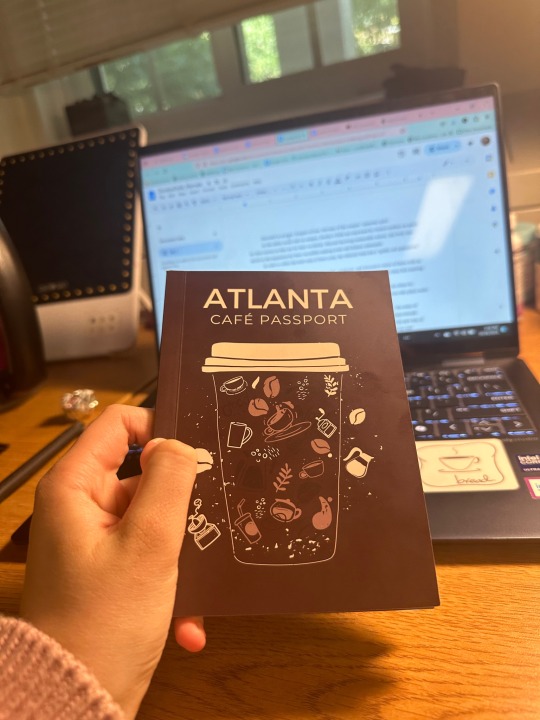
10.18.24. friday.
-> went to bed at 3am (photoshoot!)
-> cold brew with my ethics reading
-> a little gift for a café addict (yours truly)
-> chipping away at my essays
-> going to try and write in german in my diary. intimidated. any suggestions?
#studyblr#aesthetic#kimblestudies#studying#studyspo#100 days of productivity#dark academia#study#reading#philosophy#ethics#utilitarianism#john stuart mill
19 notes
·
View notes
Text
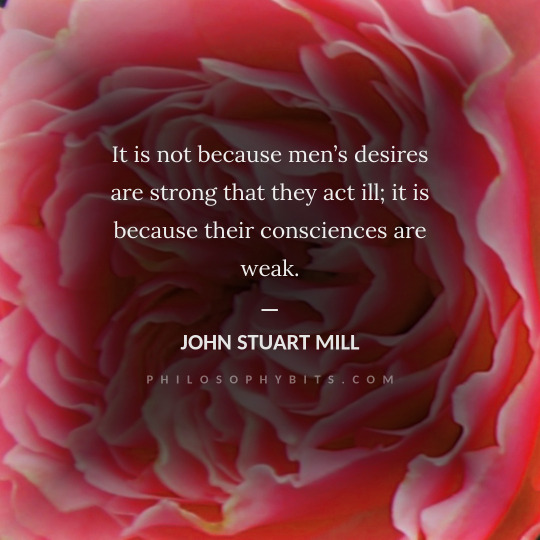
#philosophy#quotes#John Stuart Mill#On Liberty#Mill#desires#needs#conscience#values#virtue#humanity#ethics
6 notes
·
View notes
Text
12. The Dangers of Half-Truths: Honoring Complete Knowledge Over Ignorance and Lies
“Not the violent conflict between parts of the truth, but the quiet suppression of half of it, is the formidable evil: there is always hope when people are forced to listen to both sides; it is when they attend only to one that errors harden into prejudices, and truth itself ceases to have the effect of truth, by being exaggerated into falsehood.” — John Stuart Mill
In the relentless arena of ideological conflict, where unyielding ambition clashes with deep-seated convictions, a legion of dissenters emerges, intoxicated by the fervor of their own beliefs. Their audacity, akin to an uncontrollable wildfire, obscures the subtle snares and intricate plots woven by a perceptive adversary shrouded in the shadows of prevailing thought. Each step forward is fraught with danger, as hidden perils — both duplicitous allies and shrewd opponents — linger in the periphery, ready to deliver a deathly blow to their certainties.
Opposing them stands a faction, masters of strategic ambiguity and thoughtful dissent, skilled at converting disorder into a tactical advantage. To misjudge their expertise is to invite catastrophe; in their pursuit of intellectual ascendancy, these intrepid warriors overlook a haunting reality: a leader devoid of wisdom can mislead even the most courageous into a mire of deception, much like a unwitting horde of fighters staggering into a carefully hidden trap.
As John Stuart Mill chillingly reminds us, the most insidious danger lies within minds that recoil from dissent, their stubbornness embodying a blindness as fatal as stepping into a minefield. A singular, unchallenged belief festers like a contagious psychogenic disease, stifling dynamic growth and leaving the unwary open to the deadly strike of self-deception. In this mire and stagnation, the refusal to question norms creates fertile ground for dogma, where critical thinking withers, and rational thought becomes a mere whisper silenced beneath the weight of conformity. Thus, the refusal to engage with dissent is not only a denial of truth but an invitation for ignorance to flourish unchecked.
In this ruthless gladiatorial arena of ideas, a myopic perspective can plunge one into an all-consuming abyss; the terrors of the unknown become a lurking specter, ready to prey upon newfound frailties. The abrogation of dissent echoes the folly of disregarding an ominous battle cry, with grave consequences lurking in the shadows due to a perilous moral hubris. Those ensnared by the allure of half-truths, desperately clinging to the soothing illusions of certainty, neglect the rich tapestry of diverse thoughts, unwittingly inviting the insidious creep of ignorance to tighten its grip around their minds. In this dangerous dance with complacency, the potential for true enlightenment dims, as the vibrant symphony of ideas is reduced to a cacophony of conformity, stifling the intellectual vitality essential for growth and understanding.
Mill’s profound warning urges us to build fortifications in this existential struggle of ideation: we must actively confront discordant viewpoints and sharpen our minds against the relentless onslaught of opposition. Just as a strategic commander meticulously analyzes every angle prior to deploying their troops into battle, individuals are called to engage with the complex challenges posed by dissenting opinions. Through this engagement, we reinforce our understanding, fortifying ourselves against the ambushes of ignorance that threaten to undermine our convictions. Embracing diverse perspectives not only hones our own beliefs but also cultivates resilience, allowing us to navigate the tumultuous landscape of thought with clarity and strength. In this way, we transform confrontation into opportunity, fostering a robust intellectual environment in which ideas can thrive.
To wall oneself off within the confines of dogma is to invite inevitable ruin. An oblivious soldier overlooks the nuanced movements of the enemy, just as the stifling of dissent simmers like an untreated wound, corroding the very pillars of society. When a solitary voice monopolizes the dialogue, it spins a treacherous narrative that cultivates confusion and ignites division among would-be allies, transforming comrades into adversaries amidst the turmoil of miscommunication. This dynamic fuels an atmosphere rife with suspicion and hostility, undermining collaboration and collective progress. In allowing a single perspective to dominate, we risk not only the clarity of our own understanding but also the solidarity needed to navigate the complexities of human interaction, ultimately jeopardizing the very fabric of our communal existence.
Mill’s unwavering perspective passionately urges us to take up arms in this arena of thought; to engage in a visceral confrontation with the symphony of divergent opinions instead of banishing them into silence. The clash of ideas is not a mere backdrop; it acts as the powerful rumble that breaks the stillness, illuminating pathways through the thick haze of collective deception. In this dynamic exchange, each voice adds to a richer tapestry, exposing hidden truths and challenging complacency. Embracing this cacophony allows for a deeper understanding of our own beliefs, forging connections that can lead to innovative solutions and shared progress. By acknowledging and engaging with opposing viewpoints, we transform the battlefield of ideas into a crucible for growth and discovery, ensuring that the light of truth prevails amid the shadows of ignorance.
The stakes are indeed monumental; entrenching oneself in half-truths opens the door to ruin's inexorable march. Mill’s unsettling truth echoes through the ages: yielding to ignorance allows deception and moral decay to infiltrate the very essence of our discourse. By courageously championing the richness of diverse ideas, we begin to dismantle the suffocating grip of ignorance, paving the way for truth to rise resiliently against the advancing shadows of falsehood. This active defense of perceptual integrity not only enriches our collective understanding but also fosters an environment where honesty and clarity can thrive, safeguarding the moral underpinnings of our society. Engaging with complexity and contradiction fortifies us against the lure of simplistic narratives, empowering us to navigate the intricate landscape of human thought with integrity and conviction.
In this chaotic and tumultuous landscape brimming with unchallenged narratives, we now carry the weight and responsibility of combating the insidious spread of ignorance, ensuring that the raw and unembellished essence of truth resurfaces, battered yet unyielding and victorious in this ruthless contest of ideas. Embracing this struggle not only enriches our own understanding but also fortifies the very foundation of discourse, cultivating an environment where truth can emerge and thrive, defiant against the encroaching evils of complacency and misinformation.
The Nature of Truth: A Complexity of Perspectives
Envision, if you dare, truth as an arcane map—a vast, treacherous labyrinth etched into the very fabric of existence, where each winding path pulses with the heartbeat of countless human experiences, a wild tapestry woven from conflicting beliefs and perceptions. This is no mere destination waiting to be conquered; it is an epic journey of ferocious discovery. At the forefront stands Mill, a fierce torchbearer igniting our spirits, urging us to brave the tempestuous storm of opposing viewpoints. To engage in this tumultuous dance of ideas isn’t just a challenge; it’s an exhilarating plunge into the depths of intellectual chaos, where the clash of thoughts becomes a thrilling odyssey, propelling us toward enlightenment.
As we surrender to this exhilarating expedition, we shed the skin of passive observers, transforming into intrepid explorers in an unfathomable wilderness. Each confrontation of conflicting ideas becomes a grueling trial, a crucible where our beliefs are forged and sharpened like blades in a fiery vortex. Here, in the whirlwind of discourse, assumptions are ruthlessly challenged, layers of ignorance stripped away until only the gleaming essence of clarity remains. This is not just discourse; it is a raw, exhilarating struggle, where the sparks of debate ignite the flame of critical thought—an electrifying journey through the uncharted territories of our own minds, revealing the profound depths of understanding we never knew existed.
Yet, within this impassioned quest lies the ultimate test of courage: the boldness to shatter the very foundations of our old beliefs. To traverse this intricate and often perilous landscape of truth is to wield a sword, tempered by the fires of revelation, against the lurking shadows of ignorance and dogma that threaten to ensnare us. Mill’s impassioned call urges us to plunge headfirst into the vibrant chaos of ideas, transforming our understanding from a stifling echo chamber into a dynamic battlefield alive with the promise of growth and transformation. Step boldly into this electrifying dance of discovery, where every question you dare to ask becomes a key unlocking the hidden mysteries of existence, guiding you through the exhilarating labyrinth of the human experience.
The Dangers of Silence: Increased Vulnerability to Psychopathy By Suppression Over Conflict
In the realm of human interaction, silence can be a double-edged sword. While it may seem a preferable alternative to conflict, it often paves the way for manipulation and predation, particularly by those with psychopathic inclinations. When the lines of communication are severed, the intricate tapestry of human emotions—fear, anxiety, and trust—becomes vulnerable to exploitation. Psychopaths are not mere spectators in this silence; they are predators who thrive in its shadows, weaving their deceitful webs in the absence of open dialogue.
Communities that prioritize the stifling of dissent over the engagement of conflict unwittingly strip themselves of the rich complexity inherent in human relationships. Suppressed disagreements fester beneath the surface, allowing manipulative figures to cultivate an image of reliability while concealing their sinister motives. What might initially appear as harmonious coexistence often serves as a mask for deeper discord.
Psychologically, the avoidance of conflict induces cognitive dissonance. Members of the community find themselves torn between their instincts and an enforced conformity to prevailing norms. This enforced silence leads to moral disengagement, where individuals ignore their internal compass to maintain peace. In this environment, predators can operate undetected, their sociopathic traits flourishing in the fertile ground of ignorance and denial.
Moreover, the cultivation of silence exacerbates underlying tensions, spawning an atmosphere of mistrust. As individuals retreat from voicing their discontent, the remaining voices grow more extreme, distorting the communal narrative. Psychopaths, adept at manipulation, can exploit these fractures, using the silence and inconsistencies as tools for their predation—an insidious form of social parasitism.
The suppression of conflict further undermines a community's resilience. This learned helplessness breeds apathy, leaving individuals defenseless against manipulation. The vitality of a community lies in its ability to confront challenges openly; without this, its foundation weakens, allowing the most unscrupulous individuals to thrive unchecked.
To fortify against such dangers, we must reevaluate our relationship with conflict. It is not merely an obstacle to harmony but a necessary catalyst for authentic connection and community resilience. Embracing dialogue and dissenting opinions equips communities to challenge the lurking threat of psychopathy. In this proactive stance, silence loses its allure, replaced by a shared understanding of collective principles and unified strength.
Ultimately, dismantling the dichotomy of silence versus conflict is crucial. Embrace the complexities of open discourse, for it is through rigorous engagement that we can confront the predatory elements within society. By committing to transparency and accountability, we empower our communities to turn the tides against psychopathy, transforming potential vulnerabilities into robust defenses where open communication reigns supreme.
The Ego Trap: A Psychological Examination of Egotism and Confrontation
John Stuart Mill asserted that engaging with opposing viewpoints acts as a crucible for hope and personal growth, an inspiring ideal urging us to broaden our perspectives. Yet, as we probe the depths of our current reality, this notion increasingly reveals itself as a fragile dream, overshadowed by the pervasive silence and avoidance that stifle genuine discourse. In this modern landscape, the insistence on remaining mute in the face of contrasting opinions gives rise to a malignant form of egotism—a carefully constructed fortress wherein individuals retreat to protect their inflated self-images.
This silence is anything but benign; it fosters an insidious delusion that isolates us within self-imposed echo chambers. Here, individuals encircle themselves with the familiar affirmations of their beliefs, allowing the soothing balm of agreement to muffle the more discordant notes of dissenting ideas. The cacophony of conflicting thoughts, which could ignite meaningful discussions, is silenced, replaced by a chorus that swells the ego, inflating the sense of superiority among those who partake in this dissonance-free existence.
The psychological ramifications of such isolation run deep. In this cocoon, the ego is nurtured, growing ever more robust, while the capacity for true understanding withers on the vine. It is an irony steeped in tragedy: the very act of avoiding uncomfortable conversations breeds a false sense of security, veiling us from the harsh but necessary realities of the broader world. Within this bubble, the allure of certainty seduces the mind, compelling it to dismiss the complexities of opposing views as irrelevant or misguided.
As egos swell unchecked, the ability to engage with diversity of thought diminishes, leaving a barren landscape devoid of challenge. The avoidance of dialogue becomes not merely a personal choice but a collective malaise, where mutual understanding is sacrificed at the altar of fragile perceptions. Instead of engaging with the world, individuals succumb to self-congratulatory narratives, believing themselves more enlightened by virtue of their isolation—a dangerous mirage that perpetuates ignorance.
To resist this psychological decline, we must seize upon the fundamental truth that engagement—however uncomfortable—is the bedrock of evolution, both individually and collectively. The very act of confronting opposing views can unveil hidden biases, spark introspection, and illuminate fallacies within our own arguments. It is through this friction that we forge resilience and adaptability, qualities essential for navigating the complexities of contemporary life.
In confronting the other, we find not just discord, but the potential for kinship; instead of locking ourselves away in our silos of self-righteousness, let us seek the interstice where dialogue can thrive. The true power of discourse lies not in the imposition of our views upon others, but in the recognition that our understanding is but a shard of a greater reality. Only by breaking the chains of silence can we escape the echo chamber's grasp and embrace the rich tapestry of perspectives that surrounds us.
Thus, let us challenge ourselves: engage in the uneasy conversations, lean into the friction of opposing ideas, and resist the seductive pull of silence. Through this, we reclaim our agency—transforming ego's shackles into instruments of growth. In this exchange, we do not merely elevate our individual understanding; we cultivate a community rooted in empathy and resilience, forever wary of the seductive silence that threatens to ensnare us.
The Consequences of Engaging Only One Side: Exaggeration into Falsehood
The dangers of selective engagement become apparent when we consider how focusing exclusively on one side impacts the perception of truth. In the modern landscape, social media and rapidly evolving news cycles constitute a fertile ground for selective engagement, a phenomenon where our perception of reality becomes distorted and manipulatively curated. Platform algorithms, designed to maximize engagement, inadvertently trap users within echo chambers—spaces where only familiar ideologies are reinforced, and conflicting viewpoints are systematically suppressed.
This deliberate shaping of our media experiences underscores a psychological transformation. Users are not mere passive recipients of information; instead, they actively seek out content that resonates with their pre-existing beliefs. As a result, a precarious sense of self-righteousness grows. Within these echo chambers, dissent is not just challenged—it faces active hostility. This tribalistic mindset nurtures cognitive defenses, crippling one’s capacity for critical thinking and reducing complex issues to simplistic binaries.
As news cycles accelerate, the overwhelming volume of information can lead to moral absolutism. Individuals concoct rigid moral frameworks, perceiving themselves as virtuous while branding dissenters as the 'other.' This creates a chilling disconnection from empathy, as social media fosters a sense of invulnerability, enabling people to dismiss nuanced human experiences in favor of a combative us-versus-them mentality, further deepening societal divides.
The erosion of intellectual rigor is profound. Engaging critically with diverse perspectives becomes a daunting task, especially as the selective engagement phenomenon debases the neurological pathways necessary for complex reasoning. This cognitive stagnation renders individuals susceptible to the machinations of those adept at manipulation—be they ideologues or self-serving influencers—who exploit these psychological vulnerabilities in pursuit of followers and influence.
When confronted with contradictory information, individuals often plunge into the tumultuous waters of cognitive dissonance, a psychological state that reveals the fragility of the human mind. Rather than engaging in introspection or recalibrating their beliefs, these users typically resort to a defensive posture, a primal instinct rooted in the deep-seated need for self-preservation. This knee-jerk reaction shields them from the discomfort of confronting their own ignorance, effectively barricading them within a fortress of familiar narratives that provide a false sense of security. Such responses are not merely shallow; they represent a complex interplay between the psyche and the external world, where the fear of being wrong morphs into a debilitating cycle that perpetuates a comforting but misleading sense of certainty. In this landscape, the true nature of psychogenic disorders comes to light, as the refusal to acknowledge discomfort can lead to anxiety, paranoia, and other emotional maladies that further entrench individuals in their rigid worldviews. Ultimately, this cycle reflects a profound struggle between the desire for truth and the fear of the unknown, illustrating the depth of the human condition in the face of a challenging reality.
Moreover, this cycle feeds a malignant form of social pathology. Individuals become prime targets for sociopathic manipulation, wherein the manipulators, attuned to the emotional vulnerabilities inherent in selective engagement, craft compelling but deceptive narratives that flourish in the absence of scrutiny. Consequently, the line between reality and fabrication blurs as the comfort of familiar beliefs stifles curiosity, enabling misinformation to thrive unchecked.
Ultimately, social media and the rapid-fire nature of news cycles perpetuate a multi-faceted threat to our understanding of truth. By encouraging selective engagement, they cultivate intellectual stagnation, foster moral division, and facilitate opportunistic exploitation. To navigate this convoluted terrain, we must consciously confront our biases, seek out uncomfortable truths, and work to reclaim the rich complexities of understanding in an era increasingly defined by division.
The Power of Open Dialogue for Collective Evolution
In the realm of intellectual pursuit, Mill’s insights emerge as a clear call, urging us to recognize the indispensable power of dialogue in our relentless search for truth. By advocating for the amalgamation of diverse perspectives, he carves out a path not just toward hope, but toward a profound mutual understanding that can reshape societies. This intricate dance of listening—engaging with opposing viewpoints—forces individuals to confront their ingrained biases and grapple with the tangled web that constitutes reality.
Within this sophisticated arena of open discourse, where a myriad of truths intersect and coexist, lies the potential for societal enlightenment. Here, genuine connections are forged through the friction of ideas, illuminating the path to deeper relationships and shared understanding. To permit a singular narrative to eclipse all others is not merely an oversight; it is an invitation to intellectual stagnation and societal division—a perilous step backward that stifles the dynamic exchange of ideas that underpins human progress.
In stark contrast, embracing the entirety of truth lays the groundwork for collective wisdom, igniting innovation and nurturing a sense of community that transcends superficial divides. This delicate interplay of voices not only enriches the human experience, but also transforms dialogue into a formidable weapon for understanding and unity in the face of an increasingly complex and fragmented world.
8 notes
·
View notes
Text
La convicción profunda de un hombre les substrae a los ataques del ridículo.
(John Stuart Mill)
#textos#textos nocturnos#pensamientos#frases#vida#books & libraries#escritos de amor#culture#palabras#amor#john stuart mill#escritores#pensamientos de un escritor#escritor tumblr#poetas#un escritor dice#escritora#poemas de amor#literatura
11 notes
·
View notes
Text

"The peculiar evil of silencing the expression of an opinion is, that it is robbing the human race... If the opinion is right, they are deprived of the opportunity of exchanging error for truth: if wrong, they lose, what is almost as great a benefit, the clearer perception and livelier impression of truth, produced by its collision with error." -- John Stuart Mill
#John Stuart Mill#freedom of speech#freedom of expression#free speech#opinion#truth#religion is a mental illness
6 notes
·
View notes
Text
One of the greatest dangers, therefore, of democracy, as of all other forms of government, lies in the sinister interest of the holders of power: it is the danger of class legislation; of government intended for (whether really effecting it or not) the immediate benefit of the dominant class, to the lasting detriment of the whole. And one of the most important questions demanding consideration in determining the best constitution of a representative government, is how to provide efficacious securities against this evil.
John Stuart Mill, "Representative Government" in On Liberty and Other Essays (Oxford), 299.
33 notes
·
View notes
Text
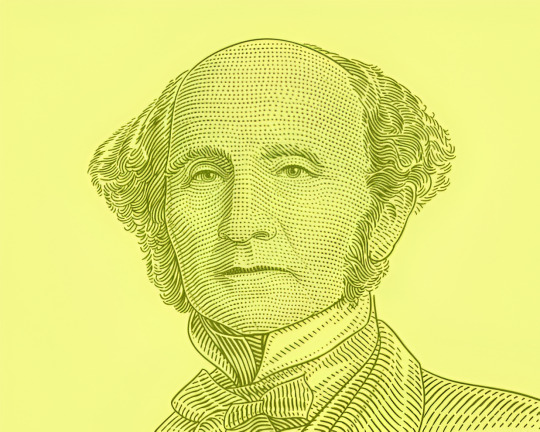
«La moral utilitarista reconoce en los seres humanos la capacidad de sacrificar su propio mayor bien por el bien de los demás. Sólo se niega a admitir que el sacrificio sea en sí mismo un bien. Un sacrificio que no incremente o tienda a incrementar la suma total de la felicidad se considera como inútil.»
John Stuart Mill: El utilitarismo. Alianza Editorial, pág. 79. Madrid, 2014.
TGO
@bocadosdefilosofia
@dias-de-la-ira-1
#mill#john stuart mill#el utilitarismo#utilitarismo#sacrificio#bien#sacrificio útil#felicidad#mayor bien#incremento de la felicidad#teo gómez otero
5 notes
·
View notes
Text












Mo Yan. Herta Müller. Jean-Jacques Rousseau. Lao Tzu. Seamus Heaney. Claude Simon. Octavio Paz. John Stuart Mill. Gabriel Garcia Marquez. John Locke. Orhan Pamuk. Naguib Mahfouz.
#literature#poetry#quotes#writeblr#writing prompt#star signs#zodiac signs#mo yan#herta muller#jean jacques rousseau#lao tzu#seamus heaney#claude simon#octavio paz#john stuart mill#gabriel garcia marquez#john locke#orhan pamuk#naguib mahfouz
16 notes
·
View notes
Quote
Since the state must necessarily provide subsistence for the criminal poor while undergoing punishment, not to do the same for the poor who have not offended is to give a premium on crime.
John Stuart Mill, Principles of Political Economy
100 notes
·
View notes
Text
Who can tell how many of the most original thoughts put forth by male writers, belong to a woman by suggestion, to themselves only by verifying and working out? If I may judge by my own case, a very large proportion indeed.
-John Stuart Mill, ‘The Subjection of Women’, in Alice S. Rossi, The Feminist Papers: From Adams to de Beauvoir
24 notes
·
View notes
Text
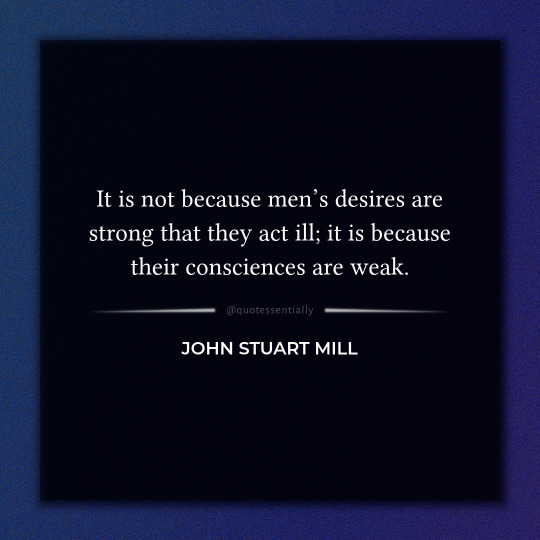
From John Stuart Mill’s On Liberty
11 notes
·
View notes
Text
Gli uomini malvagi non hanno bisogno che di una cosa per raggiungere i loro scopi, cioè che gli uomini buoni guardino e non facciano nulla.
John Stuart Mill
5 notes
·
View notes
Text

12 notes
·
View notes